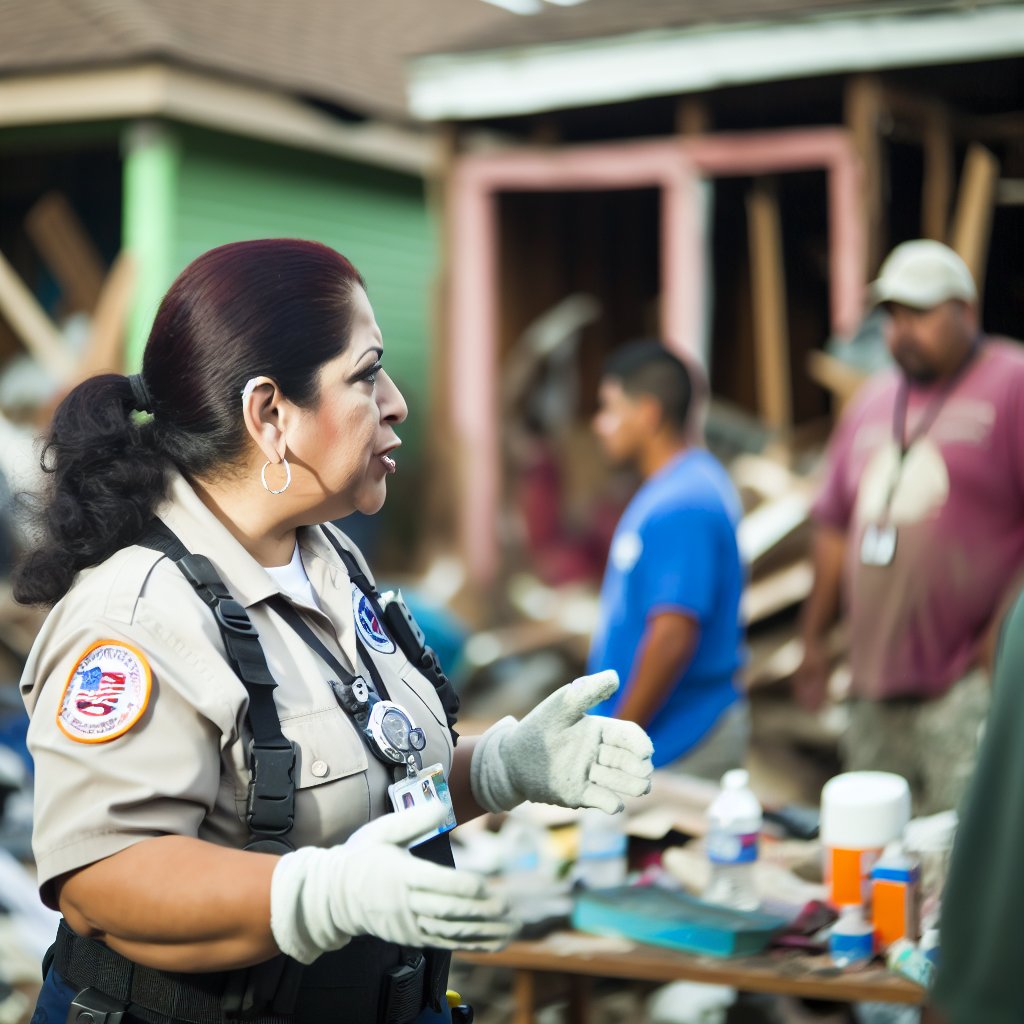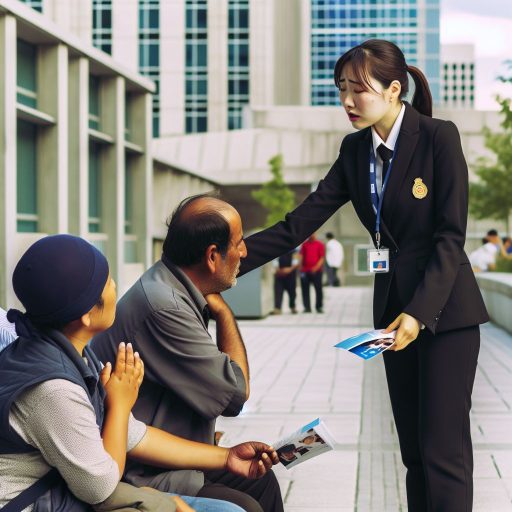Introduction
Community Health Workers are key individuals who provide support, information, and resources to communities during disasters.
They work closely with vulnerable populations to ensure their well-being before, during, and after a disaster.
Community Health Workers play a crucial role in disaster response by bridging the gap between affected communities and formal healthcare systems.
They are often trusted members of the community who understand local needs and cultural nuances.
Definition of Community Health Workers
Community Health Workers are frontline public health workers who are trusted members of the community they serve.
They have a close understanding of the community’s needs, and they work to provide culturally sensitive and appropriate health education and support.
Community Health Workers often act as liaisons between the community and healthcare providers.
They help to ensure that individuals have access to necessary resources and information.
They play a vital role in promoting health and well-being in their communities, especially during times of crisis.
Importance of Community Health Workers in Disaster Response
Community Health Workers are essential in disaster response because they have established relationships with community members.
They can quickly mobilize resources and support during emergencies.
These workers provide immediate assistance and help individuals navigate the complex healthcare system in times of crisis.
During disasters, Community Health Workers provide vital information on emergency preparedness, evacuation procedures, and available resources.
They also offer emotional support and reassurance to community members experiencing trauma or stress.
Their presence can help alleviate fear and confusion, leading to better outcomes for the community as a whole.
Community Health Workers are indispensable in disaster response efforts due to their unique ability to connect with communities.
They provide culturally competent care and support individuals in times of need.
Their contributions are invaluable in promoting health and safety during disasters.
Training and Education of Community Health Workers
Community Health Workers play a crucial role in disaster response.
To effectively carry out their duties, they undergo specific training and education programs.
Transform Your Career Today
Unlock a personalized career strategy that drives real results. Get tailored advice and a roadmap designed just for you.
Start NowTraining Programs for Community Health Workers
Community Health Workers receive training from various sources.
These sources include government agencies, non-profit organizations, and educational institutions.
These programs equip them with the necessary skills and knowledge for disaster response efforts.
Training programs cover a range of topics, such as emergency management, first aid, risk communication, and community outreach.
Community Health Workers learn to identify potential hazards and assess community needs.
They also provide support during emergencies.
Some training programs focus on specific disaster scenarios and natural disasters.
Disease outbreaks or terrorist attacks are also included in the training.
Community Health Workers are taught to respond effectively in different situations.
They learn to collaborate with other emergency response professionals.
Role of Community Health Workers in Disaster Preparedness and Response Training
Community Health Workers play a key role in disaster preparedness and response training.
They educate community members on staying safe and healthy during emergencies.
They serve as a bridge between the community and public health agencies.
Community Health Workers offer valuable support and guidance.
During training sessions, they engage with community members to raise awareness about disaster risks.
They provide information on preparedness strategies and available resources.
They help individuals and families develop emergency plans and assemble emergency kits.
Community Health Workers assist in accessing essential services.
They also conduct drills and exercises to simulate emergency situations.
Showcase Your Business Today
Reach thousands of readers actively exploring professional services. Publish your business profile and grow your audience now.
Publish NowThese exercises are crucial for testing response plans.
Community Health Workers provide feedback on the effectiveness of these exercises.
They identify areas for improvement to enhance community resilience.
By actively participating in disaster preparedness and response training, they strengthen community capacity.
Community Health Workers help respond to disasters effectively.
This reduces the impact on public health and safety.
Their dedication and commitment make them valuable assets in disaster response efforts.
Communication and Coordination during Disaster Response
Community Health Workers play a crucial role in disaster response.
They serve as liaisons between community members and healthcare providers.
During disasters, timely and accurate communication is vital.
This ensures the safety and well-being of individuals in affected areas.
Community Health Workers act as the frontline communicators.
They bridge the gap between the community and healthcare services.
Role of Community Health Workers in Disseminating Vital Information During Disasters
- Community Health Workers help disseminate important information about disaster preparedness and response to community members.
- They educate individuals on how to stay safe during emergencies, evacuate when necessary, and access healthcare services.
- Community Health Workers also play a crucial role in dispelling misinformation and addressing concerns of the community during disasters.
- They provide updates on available resources, shelters, medical assistance, and emergency contact information to residents in affected areas.
By actively engaging with community members, Community Health Workers ensure that everyone has access to critical information.
They provide resources needed to navigate through a disaster.
Their effective communication during crises helps save lives.
This minimizes the impact of emergencies on vulnerable populations.
See Related Content: Mental Health Support by Gerontologists
Providing Support and Assistance to Vulnerable Populations
Community Health Workers play a crucial role in identifying and assisting vulnerable populations during disasters.
They are often the first line of defense in reaching those who are most at risk and providing essential support.
Role in Identifying and Assisting Vulnerable Populations:
- Community Health Workers conduct door-to-door assessments to identify individuals with special needs, such as the elderly or disabled.
- They collaborate with local organizations and government agencies to ensure resources reach vulnerable populations in a timely manner.
- Community Health Workers provide emotional support and comfort to those who may be traumatized by the disaster.
- They help connect vulnerable populations to medical services, shelter, and other crucial resources.
Examples of Ways Community Health Workers Provide Support:
- They distribute essential supplies like food, water, and medications to those who cannot access them on their own.
- Community Health Workers offer transportation to medical appointments or evacuation centers for those who are unable to travel.
- They organize support groups and community gatherings to help individuals cope with the emotional toll of the disaster.
- Community Health Workers advocate for vulnerable populations to ensure they receive fair treatment and resources from relief efforts.
In times of crisis, vulnerable populations are often the most in need of support and assistance.
Community Health Workers play a vital role in ensuring that these individuals are not overlooked.
They ensure that vulnerable populations receive the care and resources they require to recover from the disaster.
Uncover the Details: Top U.S. Colleges for Adoption Counselor Programs
Collaborating with Healthcare Professionals and Emergency Responders
During disaster response efforts, collaboration between Community Health Workers (CHWs) and other healthcare professionals and emergency responders is crucial.
This collaboration enhances overall effectiveness and efficiency in providing relief to affected individuals and communities.
Importance of Collaboration
- Enhances coordination and communication among response teams
- Improves resource allocation and utilization
- Strengthens the overall response in a unified manner
- Ensures holistic care and support for disaster survivors
- Minimizes duplication of efforts and reduces gaps in services
Complementing the Work of Healthcare Professionals and Emergency Responders
- CHWs act as a bridge between affected communities and formal healthcare systems
- Provide culturally sensitive and language-appropriate support
- Offer psychosocial support and mental health services
- Assist in distributing resources and essential supplies
- Conduct assessments and identify vulnerable populations
By collaborating with healthcare professionals and emergency responders, CHWs play a significant role in ensuring that disaster response efforts are comprehensive, inclusive, and effective.
Their unique skills, community connections, and cultural competencies complement the work of other responders, leading to better outcomes for those affected by disasters.
See Related Content: Time Management Tips for Volunteer Coordinators

Addressing Mental Health Needs in Disaster Recovery
- Community Health Workers’ role in providing mental health support to individuals affected by disasters
- Importance of addressing mental health needs in disaster recovery efforts
Community Health Workers’ Role in Providing Mental Health Support
Community Health Workers (CHWs) play a vital role in disaster response by providing essential mental health support to individuals affected by disasters.
In times of crisis, CHWs serve as the frontline workers who offer emotional and psychological assistance to those experiencing trauma and distress.
Importance of Addressing Mental Health Needs in Disaster Recovery Efforts
Addressing mental health needs in disaster recovery efforts is crucial as it significantly impacts the overall well-being and resilience of affected individuals and communities.
By providing timely and effective mental health support, CHWs help prevent long-term psychological consequences such as post-traumatic stress disorder and depression.
Moreover, addressing mental health needs ensures that individuals can cope with the immediate aftermath of a disaster, make informed decisions, and rebuild their lives successfully.
CHWs play a key role in identifying signs of mental distress, offering emotional support, and connecting individuals to appropriate mental health services for ongoing care and treatment.
In disaster recovery efforts, CHWs also collaborate with mental health professionals to develop comprehensive support plans tailored to the unique needs of each individual.
By working together, CHWs and mental health providers can create a holistic approach to mental health care that promotes healing and resilience.
Ultimately, addressing mental health needs in disaster recovery efforts empowers individuals to overcome adversity, restore their well-being, and rebuild their communities.
The role of CHWs in providing mental health support cannot be overstated, as they serve as the compassionate and trusted allies who guide individuals through the challenges of recovery and renewal.
See Related Content: Legal Advocacy for Domestic Violence Survivors Explained
Showcase Your Business Today
Reach thousands of readers actively exploring professional services. Publish your business profile and grow your audience now.
Publish NowAdvocating for Community Health
Community Health Workers advocate for community health by raising awareness about various health issues.
They provide education on preventive measures and connect community members to resources and services.
They serve as trusted sources of information and support for individuals and families in underserved communities.
On a local level, Community Health Workers organize health education workshops.
They conduct home visits to provide health information and collaborate with local organizations to address community health needs.
They work closely with community members to develop culturally competent health programs that meet the specific needs of the population.
On a national level, Community Health Workers participate in advocacy efforts to promote policies that support community health and well-being.
They advocate for increased access to healthcare services, improved health literacy, and increased funding for public health programs.
Community Health Workers also work to raise awareness about social determinants of health and address health disparities in marginalized communities.
Advocating for Disaster Preparedness
Community Health Workers play a critical role in advocating for disaster preparedness.
They educate community members about potential hazards, help them develop emergency plans, and connect them to disaster response resources.
They work to build community resilience and ensure that communities are prepared to respond effectively in the event of a disaster.
Examples of successful advocacy efforts led by Community Health Workers include organizing community-wide disaster preparedness drills.
They create culturally appropriate disaster response materials and partner with local emergency management agencies to develop disaster response plans.
Community Health Workers also advocate for policies that support disaster preparedness.
These policies include funding for community-based disaster response programs and training opportunities for community members.
Community Health Workers play a critical role in advocating for community health and disaster preparedness.
Their efforts help to create healthier, more resilient communities.
These efforts ensure that individuals and families are better prepared to face the challenges of disasters.
Community Health Workers in Disaster Response
Community Health Workers are indispensable in disaster response.
They provide crucial support and assistance.
Their roles include distributing vital information.
These workers identify at-risk populations.
Offering emotional support is also part of their duties.
As we have seen, Community Health Workers play a vital role in disaster response efforts.
It is essential to support and recognize the work of these unsung heroes.
By providing necessary resources and training, we can empower them.
Together, we can build more resilient communities.
Let us save lives during times of crisis.
Join us in advocating for their recognition and support.
Additional Resources
Community Health Workers | NCDHHS
Michigan Department of Health & Human Services
[E-Books for Sale]
The Big Book of 500 High-Paying Jobs in America: Unlock Your Earning Potential
$19.99 • 500 High-Paying Jobs • 330 pages
Explore 500 high-paying jobs in America and learn how to boost your career, earn more, and achieve success!
See All 500 High-Paying Jobs of this E-Book
1001 Professions Without a Degree: High-Paying American Jobs You Can Start Now
$19.99 • 1001 Professions Without a Degree • 174 pages
Discover 1001 high-paying jobs without a degree! Unlock career tips, skills, and success strategies for just $19.99!




